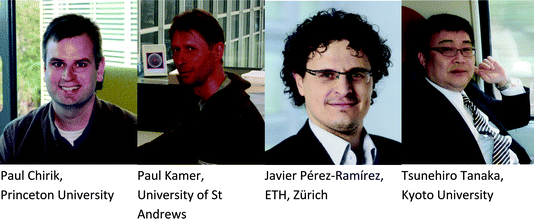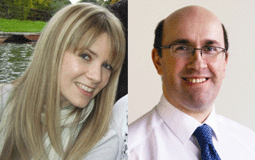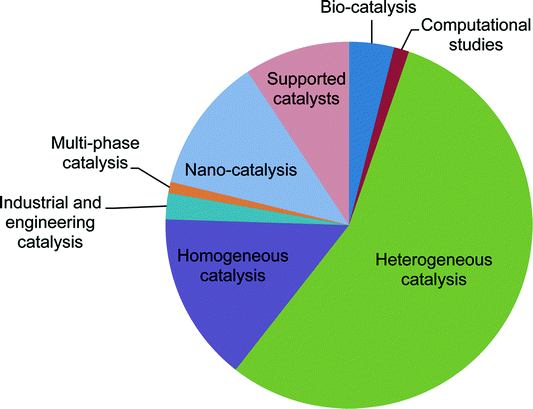Last year we celebrated Catalysis Science & Technology‘s first ever impact factor – 3.75. This signified the journal’s prominent entrance into the publishing arena; in which Catalysis Science & Technology has quickly established itself as a high impact journal for top quality catalysis research. We are delighted that the catalysis community also shares our sentiment for the journal, as evidenced by the increasing numbers of submissions from authors. In 2013, we published over 350 articles in print issues – 46 Communications, 290 full papers, 37 Perspective and Mini Review articles, and 3 Comments. A selection of our top-read review articles is shown below (Table 1).
Table 1 Top downloaded 2013 Perspective and Mini Review articles
| Title | Authors | |
|---|---|---|
| Metal sulphide semiconductors for photocatalytic hydrogen production | Kai Zhang and Liejin Guo | |
| New trends in the synthesis of crystalline microporous materials | Giuseppe Bellussi, Angela Carati, Caterina Rizzo and Roberto Millini | |
| Catalytic activity of unsupported gold nanoparticles | Yusuke Mikami, Amarajothi Dhakshinamoorthy, Mercedes Alvaro and Hermenegildo García | |
| Emerging catalytic processes for the production of adipic acid | Stijn Van de Vyver and Yuriy Román-Leshkov | |
| Epoxidation of olefins with homogeneous catalysts – quo vadis? | Simone A. Hauser, Mirza Cokoja and Fritz E. Kühn |
As Catalysis Science & Technology steps out of its infancy, quality is as strong a focus as ever. Our dedicated Associate Editors are integral to this goal. In our last Editorial we introduced Professor Tsunehiro Tanaka to the Catalysis Science & Technology team, as Professor Noritaka Mizuno stepped up to join Professor Piet van Leeuwen as Co-Editor-in-Chief. Authors can choose to submit to one of 4 Editorial Offices covering the breadth of catalysis science disciplines (Fig. 1).
 |
| Fig. 1 Catalysis Science & Technology’s Associate Editors. |
The Royal Society of Chemistry launched Catalysis Science & Technology to meet the community’s request for a society catalysis journal. In keeping with this and our worldwide readership, we strive to deliver content to benefit the entire catalysis community. Fig. 2 illustrates the diversity of subject areas that we publish, which is also reflected by our themed issues. In 2013, we published issues focusing on environmentally benign catalytic oxidation – guest edited by Alfons Baiker and Tamas Mallat; photocatalysis – guest edited by Licheng Sun and Kazunari Domen; and gold catalysis – guest edited by Graham Hutchings and Stephen Hashmi. We’re equally as excited by next year’s line-up which includes Catalytic Conversion and Use of Carbon Dioxide for Value-Added Organics – guest edited by Arjan Kleij; Sustainable Catalytic Conversions of Renewable Substrates – guest edited by Pieter Bruijinicx and Yuriy Román-Leshkov; and Mechanistic Studies in Catalysis – guest edited by John Brown, Andreas Pfaltz and Rutger van Santen. Two out of the three have an environmental-twist, and each will have representation from both homogeneous and heterogeneous author communities.
Fig. 2 Subject area breakdown of Catalysis Science & Technology’s 2013 published articles.
We know that it is our talented community that keeps quality consistently high so getting out of the office to meet people is a high priority for us. This past year, we enjoyed meeting with researchers at the 23rd North American Catalysis Society meeting; EuropaCat; the 20th EuCheMS conference on organometallic chemistry; the Organometallic Chemistry Gordon Research Conference as well as both of the ACS National Meetings. We were also proud to offer sponsorship at a number of these meetings in addition to providing several poster prizes.
The Royal Society of Chemistry’s not-for-profit ethos extends beyond our journal communities – in 2012, over 60 of our member groups each received grants of £1000 to arrange events and activities to promote the chemical sciences. These had an international nature and ranged from workshops for migrant children in Beijing and a science fair on water chemistry in southern India to supporting chemistry education in tsunami-affected areas in Sri Lanka.
By publishing with Catalysis Science & Technology, you’ll be supporting the wider scientific community and future generations of chemical scientists.
Looking for a New Year’s resolution? Raise your profile and benefit your research through the Royal Society of Chemistry.
Many happy returns for 2014!

Download the pdf here











